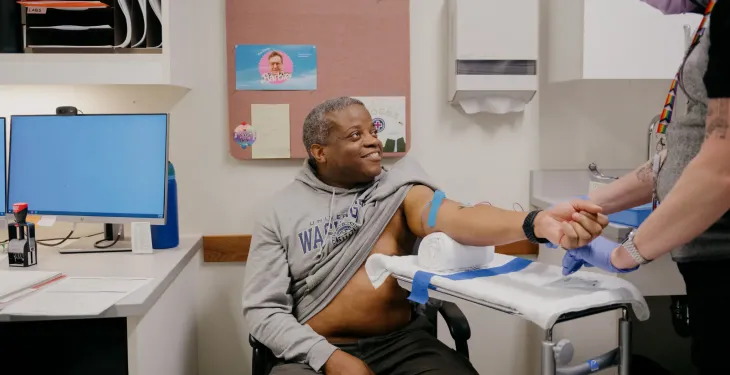



Xom Cau Vong

Xom Cau Vong

Xom Cau Vong
HIV Tests
More than 300k+ people have used community-based HIV testing & self-testing
PrEP users
More than 81k+ people have enrolled in PrEP
News channel for the gay community and LGBTQ-related social activities in Vietna
Visit now!
News channel for transgender women and LGBTQ-related social activities in Vietnam
Visit now!
Feature News
Drugs that make HIV-infected cells self-destruct induce profound viral load drops in mice after just one or two doses
Last month’s Conference on Retroviruses and Opportunistic Infections (CROI 2024) included the latest information about potential drugs and treatments that might lead to a cure. Two presentations included promising data on TACK (targeted activation of cell kill). This is a property of some drugs in the non-nucleoside reverse transcriptase (NNRTI) family which induces a chain of events leading to the self-destruction of HIV-infected cells. TACK drugs could be used as powerful drugs for HIV treatment but could also contribute to a cure by killing off HIV-infected reservoir cells.
BackgroundThe necessary condition for a cure of HIV is the elimination of all viable virus (i.e. virus capable of replication) from the body, or the containment of what remains so it never activates, even in the absence of antiretroviral therapy (ART). This is problematic because of the way HIV hides in a small number of long-lived ‘reservoir cells’ which stay inactive as long as ART is there to suppress it.
Elimination has been achieved in a handful of people through stem-cell (‘bone marrow’) transplants, which replace most or all of the immune system including the HIV-infected cells. However this treatment is too risky (and expensive) to be scaled up. Another handful of people appear to have achieved spontaneous self-cures for HIV, either after ART or without even having taken it. But we don’t know how to induce such a feat in other people.
The last decade of cure research has led to greater understanding of how HIV is able to remain in the body and shrug off immune responses that eliminate or neutralise other viruses. But it has not been able to identify the most promising pathway to a cure out of several being investigated. Direct excision of HIV from cells using genetic engineering, increasing the strength and precision of the immune response to HIV using antibodies and vaccines, or preventing HIV-infected cells from ever producing more virus are just three of them.
What TACK drugs doA fourth possibility, more recently identified, is the discovery of drugs that turn the virus’s cell-killing machinery against itself. A couple of presentations at the conference provided the latest news on these.
Aidsmap first reported on TACK drugs last year. These drugs capitalise on an effect that has actually been known about for over a decade. In addition to disabling HIV’s ability to transcribe its viral RNA into DNA for insertion into human genome, some of the currently used drugs of the NNRTI family (including efavirenz and rilpivirine, but not nevirapine or doravirine), if given at very high doses, have a second property called Targeted Activation of Cell Kill (TACK).
TACK causes cells containing HIV genes to self-destruct prematurely, before they can produce viable new viral particles. TACK may be able to eliminate most of the HIV-infected cells by itself; if not, it has potential as a ‘killer’ in the strategy known as ‘kick and kill’’, which reactivates latent HIV-infected cells in the viral reservoir for detection and elimination.
TACK has potential because it does not rely on the body’s own immune response (or an immune response enhanced by immunotherapies) to do the cell killing. Merck have found candidate drugs that act as normal Reverse Transcriptase Inhibitors, but also have TACK properties at doses no larger than the NNRTI drugs we already have. They would not only stop infected cells from making new viruses but would kill them if they try, and would not kill uninfected cells.
Latest dataDr Tracy Diamond, principal scientist of the pharmaceutical company Merck, announced new results from studies of Merck’s leading TACK drug, which has the investigatory name 0f Pyr01. Previously, Merck had only published the results of experiments testing the ability of this drug to suppress viral replication in the lab dish, where it performed better than efavirenz.
The first studies have now been conducted in mice. Lymphocytes from an HIV-negative human donor were infected with HIV in the lab dish and then injected into 30 mice whose immune systems had been altered so that they developed HIV infection like humans. Three weeks later 10 mice each were treated for one week either with a drug with TACK properties or with an NNRTI drug without TACK activity. The drugs were given in their food. The other 10 were an untreated control group.
By the end of the week’s treatment the mice’s HIV viral load had decreased by about five logs (100,000-fold) in the treated mice, regardless of which drug they were given; it increased 100-fold in the control group.
What was different was the extreme speed of viral load suppression in the mice given the TACK drug. By the third day of treatment the average viral load in the mice given the non-TACK drug had decreased tenfold and only one mouse was undetectable; in the TACK-treated mice the viral load had already fallen by four logs (10,000-fold) and seven out of 10 were virally undetectable. A difference was observable even at day one, after a single dose, where the viral load was unchanged in mice given the non-TACK drug but had already fallen 100-fold in mice on the TACK drug. Remarkably, two mice already had undetectable viral loads.
The experiment was repeated in another set of mice for only two days/doses, and after a single dose the viral load had decreased fivefold, and after two doses twentyfold, in the mice on the TACK drug. This compared with no change on day one and a twofold decline on day two in mice on the non-TACK drug.
As well as viral loads in blood plasma, intracellular HIV RNA levels (indicating productive infection) were measured by PCR in lymphocytes biopsied from the mice’s spleens. After one dose, about 1% of spleen cells were positive for HIV RNA in control animals, 0.8% in the mice given the non-TACK drug and below 0.2% in mice given the TACK drug. By day two the proportion of RNA-positive cells was essentially unchanged in the control group, was about 0.25% with the non-TACK drug and was less than 0.1% with the TACK drug. Similar declines were seen using other cell-counting techniques such as flow cytometry.
This experiment confirms that drugs with significant TACK activity are extremely fast-acting and potent antivirals when used as ART, and that their action is not simply due to their inhibition of reverse transcriptase but also due to direct cell death. (Previous experiments showing that the TACK action is annulled if the drugs are given alongside an HIV protease inhibitor such as lopinavir show that the premature activation of HIV protease is the mode of action).
Researchers now need to, firstly, confirm that TACK drugs are safe and effective in humans, especially as safety is a special concern in any drug with cytotoxic (cell-killing) effects. Even more importantly, scientists don’t yet know whether enough quiescent reservoir cells can be activated and then targeted by TACK drugs to induce a permanent and effective reduction in the HIV reservoir.
Other cellular self-destruct drugsThere may be other compounds, however, that could work alongside TACK. Aidsmap has already reported on BH3 mimetics, another class of drugs that could selectively kill off HIV-infected cells, by a completely different mechanism.
Just before Tracy Diamond’s talk, however, there was a presentation by Professor Liang Shan of Washington University in St Louis, whose lab was instrumental in investigating the TACK mechanism.
He commented that TACK drugs held out a lot of promise because they targeted essential HIV enzymes that the virus would find it hard to change. Their mode of action mirrored that of natural detectors of disordered cellular DNA that kill off infected cells and which, in fact, cause much of the catastrophic death of T-cells seen in early HIV infection.
Investigating TACK has also answered a mystery associated with immunodeficiency viruses. A few monkey species exclusive to Africa, such as the green monkey and the sooty mangabey, seem completely immune to the effects of the monkey immunodeficiency virus SIV. They tolerate high viral loads with no damage to their immune systems and SIV has become a harmless endemic virus in them, with 80% of animals infected. In contrast Asian species such as the rhesus macaque succumb at least as fast to SIV as humans to HIV.
It was found that the African species have a mutated form of a protein called CARD (Caspase-Recruitment Domain). CARD is a ubiquitous intermediary protein that is activated by the TACK-driven premature activity of HIV protease and then organises the recruitment of caspase, the enzyme that actually causes the cellular self-destruction.
We’re a long way from modifying CARD directly as it’s such an essential protein, but Shan and colleagues discovered that another protein called DPP9 partially blocks the ability of TACK drugs to set CARD in motion.
So a DPP9 inhibitor such as the cancer drug talabostat might magnify the effect of TACK drugs. In experiments in mice, the relatively mild TACK activity of the NNRTI drug efavirenz and talabostat individually reduced the number of HIV-infected cells in mice by about 30%, but by 70% when both were given together. Similarly, in the lab dish, either drug halved HIV viral activity in cells taken from people with HIV, but halved it again when both were given together.
As with the NH3 mimetics, however, talabostat is an investigatory drug that’s only so far been tried in patients with advanced cancer, and safety trials will be needed before it can be tested in humans.
Source: Aidsmap
…You Are Never Too Old for an STI
Just because a patient is older is no reason not to consider a sexually transmitted infection (STI) as the reason for their presentation, according to Justyna Kowalska, PhD, from the Medical University of Warsaw, Hospital for Infectious Diseases, in Poland.
It is important to normalize conversations around older people and sexual health, she said at the 2024 ESCMID Global Congress (formerly ECCMID), in Barcelona, Spain.
Data from the CDC indicate that rates of chlamydia, gonorrhea and syphilis among U.S. adults 55 years of age and older have more than doubled over the past 10 years. For example, rates of gonorrhea among those 55 to 64 years rose from around 15 cases per 100,000 people in 2015 to 57 per 100,000 in 2019.
In England, 31,902 new STIs were recorded in those older than 45 in 2015, which rose to 37,692 in 2019—an increase of 18%, with most new diagnoses in men who have sex with men (Perspect Public Health 2023;143[5]:263-271).
High STI prevalence estimates have also been reported more broadly in older adults around the world, including China, Korea, Kenya and Botswana.
“Rising divorce rates, forgoing condoms as there is no risk of pregnancy, the availability of drugs for sexual dysfunction, the large number of older adults living together in retirement communities and the increased use of dating apps are likely to have contributed to the growing incidence of STIs in the over 50s,” Dr. Kowalska explained. “These data likely underestimate the true extent of the problem, as limited access to sexual health services for the over 50s, and trying to avoid the stigma and embarrassment both on the part of older people and healthcare professionals, is leading to this age group not seeking help for STIs.”
Compounding the problem are the many misconceptions around sexuality and sexual activity in older adults, and the importance of sex and intimacy to older people’s happiness and well-being. “People do not become asexual with age. In fact, with preventive medicine and improved lifestyles people are enjoying a healthy life and sex life for longer. Older people often find greater satisfaction in their sex lives due to experience and known expectations,” she said.
In a study in England, one-half of men and almost one-third of women ages 70 and older reported being sexually active. Similarly, in a Swedish study, 46% of individuals 60 and older reported being sexually active, as did 10% of those 90 and older (Arch Sex Behav 2016;45:133-144 https://doi.org/10.1007/s10508-014-0465-1).
Studies show higher levels of sexual desire, greater sexual frequency and more sexual partners among older men than women. A retrospective study from the United States involving 420,790 couples aged 67 to 99 years found that widowhood was associated with an increased risk for STIs in older men, but not women. And the effects in men were larger after sildenafil, the first phosphodiesterase type 5 inhibitor, hit the market.
“These findings indicate that sexual risk taking is common among older adults, particularly men. Given that the number of people aged 60 years and older is set to double worldwide by 2050 and the widespread availability of drugs to enhance sexual activity, health professionals must be proactive in discussing sexual concerns and making sexual health a routine part of general healthcare for older adults,” Dr. Kowalska said.
Although the incidence of STIs among the over 50s is small compared with younger age groups, it is rising, and she called for raising awareness about sexual health in older adults, explaining that they came of age at a time when sex education in school did not exist.
“Health promotion messages give the impression that condoms and concerns about STIs only apply to young people. But the dangers of undiagnosed and untreated STIs such as HPV-related cancers and onward transmission are very real, particularly in this age group who are more likely to have underlying conditions such as heart disease and stroke,” she said.
Discussions about preventing HIV and STIs are important to have with older patients.
“Increasing older adults’ knowledge of the risk of STIs and how to engage in safer sex is crucial to tackling record levels of STIs,” Dr. Kowalska said. “Tailoring education programs to the over 50s and including peer support and ensuring they are located within existing community settings is vital to their success.” Ultimately, she said, “older people have a right to good sexual health, so let’s normalize conversations around sex and older people and change the narrative on aging.”
Source: IDSE
…Long-Acting Drugs May Revolutionize H.I.V. Prevention and Treatment
New regimens in development, including once-weekly pills and semiannual shots, could help control the virus in hard-to-reach populations.
A pill taken once a week. A shot administered at home once a month. Even a jab given at a clinic every six months.
In the next five to 10 years, these options may be available to prevent or treat H.I.V. Instead of drugs that must be taken daily, scientists are closing in on longer-acting alternatives — perhaps even a future in which H.I.V. may require attention just twice a year, inconceivable in the darkest decades of the epidemic.
“This period is the next wave of innovation, newer products meeting the needs of people, particularly in prevention, in ways that we didn’t ever have before,” said Mitchell Warren, executive director of the H.I.V. prevention organization AVAC.
Long-acting therapies may obviate the need to remember to take a daily pill to prevent or treat H.I.V. And for some patients, the new drugs may ease the stigma of the disease, itself an obstacle to treatment.
“To not have to remember that every morning is earth-changing for them,” said Dr. Rachel Bender Ignacio, director of University of Washington’s UW Positive, a clinical research site focusing on H.I.V. “That stigma, that internalized stigma of taking that pill every morning, is what prevents them from taking it.”
Dr. Rachel Bender Ignacio, principal investigator for University of Washington’s UW Positive, a clinical research site focusing on H.I.V.Credit…Grant Hindsley for The New York TimesLong-acting drugs are likely to be an even greater boon in populations that have long been hard to reach: patients who have spotty access to health services, or who have trouble taking daily pills because they have unstable housing or transportation, are struggling with substance use, are mentally ill or face discrimination and stigma.
In 2022, nearly 30 years after the advent of combination antiretroviral therapy, more than nine million of the 39 million people living with H.I.V. worldwide were not receiving treatment. About 630,000 died from AIDS-related illnesses that year.
Even in the United States, about one-third of those diagnosed with H.I.V. are not keeping the virus in check. “We still haven’t addressed these sort of underlying issues around access,” said Gregg Gonsalves, a longtime H.I.V. activist and an epidemiologist at the Yale School of Public Health.
“We can be elated about the science and the clinical implications” of long-lasting drugs, he added. “But for many people, it’s going to be a distant dream.”
One barometer of the excitement about long-acting regimens was their prominence at the Conference on Retroviruses and Opportunistic Infections in Denver in March. The annual meeting has served as the backdrop to many H.I.V. milestones, including the electric moment in 1996 when researchers showed that a combination of drugs could suppress the virus.
Dozens of studies of long-acting regimens were presented at the conference this year. (While most such drugs are tantalizingly close for H.I.V. prevention and treatment, similar options for tuberculosis, hepatitis B and hepatitis C are not far behind.)
One long-acting treatment — Cabenuva, two shots given every other month — has been available for nearly three years. It costs more than $39,000 annually in the United States, although few patients pay that price. Even with a steep discount, however, the treatment is out of reach for many patients in low-income countries.
Still, many researchers at the conference were excited about the results from one study showing that Cabenuva was more effective than daily pills at controlling H.I.V. even in groups that typically have trouble adhering to treatment.
“When you think about how hard it is for some folks, giving them new tools that might be able to get them to be suppressed is a big deal,” said Dr. Kimberly Smith, who leads research and development at ViiV Healthcare, which makes one of the component drugs in Cabenuva.
Cabenuva, an H.I.V. treatment, is a combination of two drugs.Credit…ViiV Healthcare, via Associated PressLong-acting drugs might be useful even for children living with H.I.V. Worldwide, only about half of children diagnosed with H.I.V. are receiving treatment.
That’s in part because of the lack of drug versions made for children, Dr. Charles Flexner, an H.I.V. expert at Johns Hopkins University, said in a presentation at the Denver conference.
“With long-acting formulations, that will no longer be the case,” Dr. Flexner said. “Children will be able to use the same formulation as adults, just at a different dose.”
Most long-acting shots contain nanocrystals of drug suspended in liquid. While oral pills must pass through the stomach and the intestinal tract before they enter the circulation, so-called depot shots deliver the drugs directly into the bloodstream. But they are released extremely slowly, over the course of weeks or months.
Some depot antipsychotics are given every two to eight weeks, and the contraceptive Depo-Provera is administered once every three months. Cabenuva — a combination of cabotegravir, made by ViiV Healthcare (majority owned by GSK), and Janssen’s rilpivirine — is injected into gluteal muscles every two months to treat H.I.V.
Cabotegravir given under the skin of the stomach produced more bruising and rashes than in the buttocks, and some people developed nodules that lingered for weeks or even months. But with gluteal injections, “there’s nothing that you see,” Dr. Smith said. “You feel pain for a couple of days and then you go on with your life.”
ViiV is trying to develop a version of cabotegravir to be given every four months and, ultimately, one every six months. The company aims to bring the four-month version to market for preventing H.I.V. in 2026, and for treatment in 2027.
Dr. Bender Ignacio checked Mr. Davis’s injection site at Harborview Medical Center.Credit…Grant Hindsley for The New York TimesBut injecting drugs into muscle is challenging for people who have significant body fat or who have silicone implants in the buttocks, as some trans women do. Some newer shots under development are administered under the skin, circumventing the problem.
Gilead’s lenacapavir can be given as a subcutaneous injection in the stomach once every six months, but it is so far approved only for people with H.I.V. who are resistant to other drugs. The drug is in multiple late-stage trials as a long-acting H.I.V. preventative in various groups, including cisgender women.
Lenacapavir is also being tested as a treatment in the form of a once-weekly pill in combination with another drug, islatravir, made by Merck. Having multiple long-acting treatments is ideal, “so people can really make the choice among the options that are going to work best for them,” said Dr. Jared Baeten, a vice president at Gilead.
Santos Rodriguez, 28, was diagnosed with H.I.V. in 2016 and has taken a daily pill ever since to suppress the virus. Mr. Rodriguez, who works on artificial intelligence at Mayo Clinic in Florida, said having to take only one pill a week would be “definitely groundbreaking for me and my adherence.”
He said he was put off by the clinic visits every two months required for Cabenuva shots, and by reports that injections in the buttocks are painful. A shot every four months or every six months would be much more attractive, he added.
To make it truly accessible for everyone, including those who may live far from a health care center, researchers must also come up with a long-acting injection that can be self-administered, some experts noted.
One team is developing exactly that and, with backing from the global health initiative Unitaid, planning to make it available in low- and middle-income nations.
Santos Rodriguez, diagnosed with H.I.V. in 2016, has taken a daily pill ever since to suppress the virus. Having to take only one pill a week would be “definitely groundbreaking for me and my adherence,” he said.Credit…Annie Flanagan for The New York Times“The really exciting thing about this is that the way that it’s being developed, it ideally will bypass the trickle-down effect to get into the people who need it most,” said Dr. Bender Ignacio, referring to the tendency of rich countries to gain access to new therapies first. She is leading the study.
The product uses a lipid base to suspend three H.I.V. drugs, two water-soluble and one fat-soluble. Unlike depot shots, which release drugs slowly, this so-called nanolozenge is taken up by the immune cells and lymph nodes immediately after it is delivered under the skin of the stomach.
The shots can carry smaller doses of drugs because of this efficiency, and they can also easily be adapted for children and adolescents, Dr. Bender Ignacio said. A single injection maintains levels of the three drugs in the body for more than a month, replacing 150 pills.
So far, the self-administered long-acting shot has been tested in just 11 people, including Kenneth Davis, 58, a resident of Auburn, Wash. Mr. Davis, who lost two family members to AIDS, likened the jab to a bee sting — fleeting and less painful than the Covid vaccines.
Because the component drugs have each been independently approved, Dr. Bender Ignacio estimated the shots could be available to treat H.I.V. in less than five years.
Many of the products, including those in Dr. Bender Ignacio’s study, can be adjusted to prevent H.I.V. There are currently only three options for that: two types of daily pills, and ViiV’s cabotegravir, which is injected into the buttocks once every two months.
“It’s been prevention where we have been lagging the greatest in the AIDS response over the last decade,” Mr. Warren, of AVAC, said.
One study presented at the Denver conference showed that when people were offered a choice of prevention methods, more of them chose long-acting cabotegravir. But the percentage opting for daily pills also rose.
“The fact that we saw protection go up with a range of methods — that to me is the most important thing,” Mr. Warren said. The study, he added, “really shows that there is now evidence behind choice, not just advocacy.”
According to The New York Times
…Toihen.vn app
The Toihen.vn webpage and app helps people set up appointments for HIV counseling and testing, pre-exposure prophylaxis (PrEP) and post-exposure prophylaxis (PEP) counseling and treatment, sexually transmitted diseases counseling and treatment, and many other services. Living by the motto of "Peace of mind - Trust - Speed - Sharing”, Toi Hen will always help you connect with LGBTQ-friendly clinics and community-based organizations in the fastest and most secure way! Try Toi Hen today!
Explore nowPrEP app
Did you already start using PrEP? Then you know how important it is to follow the PrEP plan properly! Download the iPrEP application to get reminders to take PrEP medicine on time and have regular follow-up health checks. iPrEP will also provide you with important information about PrEP at each stage of your PrEP use.
Explore now







